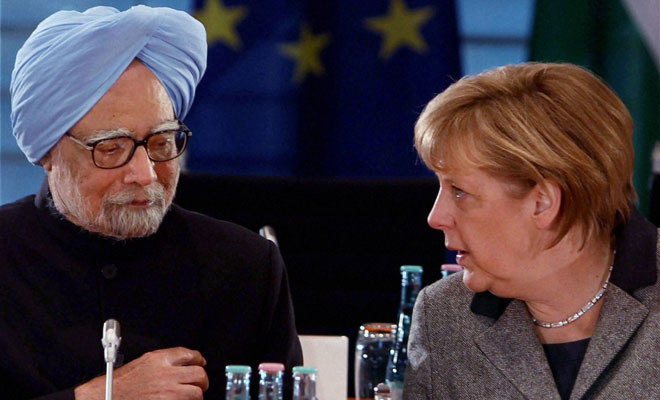Manmohan Singh, Angela Merkel agree on concluding India-EU FTA

PTI | Apr 12 2013
Manmohan Singh, Angela Merkel agree on concluding India-EU FTA
Berlin : India and Germany today set a target of concluding the long-awaited India-EU FTA (Free Trade Agreement) this year notwithstanding a number of unresolved issued and BJP’s demand for Parliamentary scrutiny this "highly controversial" move.
Prime Minister Manmohan Singh and German Chancellor Angela Merkel in a joint statement here underlined "their strong commitment to a successful outcome to the EU-India negotiations for a broad-based, ambitious and balanced Free Trade Agreement that will generate jobs and growth in both countries and their hope for final agreement in 2013."
The statement was issued at the conclusion of Singh’s 3-day visit during which he pressed Germany, Europe’s biggest economy, to provide a "strong political thrust" for inking of a broad-based Bilateral Investment and Trade Agreement (BITA) with the 27-nation European block.
The hope for concluding the FTA this year was voiced despite Merkel having candidly advocated yesterday that the two sides are yet to overcome "all the difficulties", as she pressed for an increase in the foreign equity cap in India’s insurance sector and reduction in tariffs on import of automobiles from Europe.
Even as Singh was discussing FTA with Merkel, back home, the BJP took exception to his decision to engage in the final phase of negotiations for a "highly controversial" agreement without taking into account the opposition by experts and stakeholders.
The BJP expressed apprehension that the FTA would lead to the flooding of the Indian market with dairy, poultry, sugar, wheat, confectionery, oil seeds, fisheries and plantation products from the EU. Such an agreement would "directly compromise India’s agricultural sovereignty and its food security," BJP leader Murli Manohar Joshi, said in demanding parliamentary scrutiny.
The joint statement covered a wide rage of subjects including defence collaboration and cooperation in climate change, science and technology and education.
Besides agreeing to greater cooperation at all international bodies, India and Germany agreed to continue working together to prepare the ground for India to accede to the export control regimes as a full member and thereby strengthen the international non-proliferation regime.
"The Indo-German cooperation opens up excellent prospects for developing both countries to the benefit of their peoples.
"Germany and India share the view that new initiatives in the area of trade, bilateral investment, energy, energy security, the environment, culture, education, training, research, technology and defence can catalyse and activate the great potential of their bilateral ties," the joint statement said.
Germany and India are determined to further expand their cooperation in higher education, research and technology - dynamic core areas of the Indo-German Partnership - and to open up new and innovative areas of cooperation, it said.
The statement titled ’Shaping the future together’ noted that close trade and investment relations are a core dimension of bilateral partnership and of great importance for the development of both the Indian and the German economy.
"Both Governments will strongly back a further intensification of Indo-German business cooperation. Both sides would encourage cooperation in the field of rare earths on mutually beneficial terms. Both Governments recognise that expanding high technology trade and cooperation is key to deepening the strategic content of their relations.
"Both sides agree to consult regularly on advancing this objective and to this end form a High Technology Partnership Group including both government and business," it said.
Both sides emphasised that freedom of movement for business visitors and professionals is important for the sustained growth of trade and investment flows. Both sides agreed to work together to facilitate such movement between the two countries.
Germany and India expressed satisfaction at the deepening comprehensive bilateral relations between India and EU and "recognise that both India and EU, as long-standing strategic partners, are committed to working together to reinforce the relationship in all areas".
It added that Germany and India will seek to intensify consultations within the G20 and strengthen the G20’s role as the premier forum for international economic and financial cooperation.
"Both sides will therefore make strenuous efforts to achieve a consensus on trade facilitation by a balanced package of issues this year at the 9th WTO Ministerial Conference so as to ensure there is still a prospect of bringing the Doha Round to a conclusion," it said.
On the security front, both sides agreed to intensify further their exchange of views and experience on combating terrorism as well as their practical cooperation in this connection, also in the Indo-German Working Group on Counter-Terrorism as well as multilateral forums.
"In the light of new security challenges both sides are keen to intensify their security policy dialogue and exchange of views.
"Both sides expressed their keenness to enhance cooperation in the defence sector through dialogue and exchanges on matters of mutual interest, including in the area of defence technology collaboration," the statement said.
Germany and India reaffirmed that they will work together for a world without nuclear weapons, for universal and non-discriminatory global nuclear disarmament.
Both countries stress the importance of national and international efforts to reduce risks of nuclear and radiological terrorism.
Germany and India recalled their cooperation in the UN Security Council during 2011-12 and agreed to continue to collaborate in strengthening and reform of the United Nations and the multilateral system.
In this context, they reaffirmed their commitment to continue their efforts through the G-4 to reform the Security Council by expansion of both categories of its membership, and underlined their support for each other’s candidature for permanent membership of an expanded Security Council.
The two countries condemned the North Korean nuclear test conducted on February 12 as a violation of Pyongyang’s international commitments and call upon the country to respect its international obligations as set out in several the UN Security Council resolutions in this connection and to take urgent steps to deescalate the situation.





